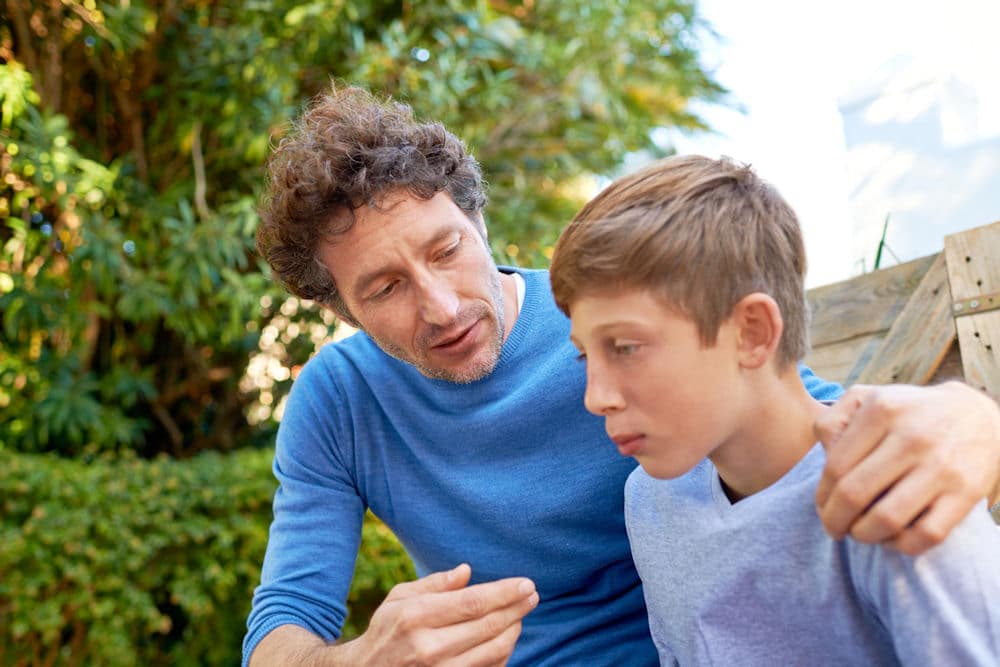Guide for Children of An Addict
Having a family member that suffers from addiction can be a challenging and overwhelming experience, especially if that family member is living in the same household. When that family member is the parent or parents of a child or children, it can make matters even more complicated.
In many cases, the child of an addict may feel as though they don’t have the support that they need from their parent because of their addiction. Or, if the child is older, they may feel as though they have to be the one responsible for keeping the house in order.
If you are the child of an addict, it’s important to remember that you are not alone in this journey. Keep reading to learn about the resources and support available as well as ways you can deal with an addicted parent while also not sacrificing your overall health and well-being.

While no child wants to see their parent in a state of vulnerability or see them struggle, being able to properly identify the signs and symptoms of substance abuse and addiction can be a crucial first step in getting them the help they need before their addiction continues to worsen.
If you suspect that your parent may be struggling with substance abuse or addiction, below are some common signs to be on the lookout for:
- Changes in behavior: Mood swings, irritability, or aggression
- Neglecting responsibilities: Not going to work, not keeping the house clean, not going grocery shopping, etc
- Changes in physical appearance and personal hygiene: Not showering, looking unkempt, bloodshot eyes, drastic changes in weight, etc
- Acting secretive: Hiding substances and/or paraphernalia, lying about using substances, frequently disappearing, etc
- Relationship problems: Problems developing in relationships with other family memes, friends, etc due to substance abuse or addiction
- Financial problems: Noticing the development of unexplained financial problems that didn’t previously exist
- Legal problems: Getting arrested or pulled over for drug or alcohol-related issues.
How Addiction Affects Parents
When a parent is suffering from addiction, it can affect the entire household. Their addiction can not only hurt their spouse but also their children as everyone else feels as though they have to pick up the slack.
A parent that is struggling with addiction may experience impaired judgment and decision-making abilities, neglect of parental responsibilities, financial instability, and emotional instability.
Effects of Substance Abuse on Children
Unfortunately, children growing up in a household where at least one parent is suffering from substance abuse or addiction is far too common. In fact, according to the National Institute on Drug Abuse, roughly 25% of all American kids grow up in a household where substance abuse is present.
Children that grow up in a household with at least one addicted parent are more likely to experience the following issues:
- Poor performance in school
- Emotional distress
- Physical and/or emotional abuse
- Low self-esteem
- Neglect
- Social problems
- Drug or alcohol issues of their own
How To Help A Parent with Addiction
When it comes to helping a parent with addiction, seeking help outside of the home is crucial. For children of addicted parents, there are many options available when it comes to seeking support and guidance.
School counselors can offer a safe space for children to express their concerns and provide guidance on accessing community resources. Additionally, support groups such as Al-Anon and Nar-Anon provide specific support for family members of individuals struggling with addiction, including children of addicted parents.
Mental health professionals are also available to help children and families navigate the challenges of addiction and provide coping strategies.
Dos and Donts
For a child, helping a parent that is struggling with addiction can be a tough thing to navigate. After all, traditionally the parent is supposed to be the one that is there to help guide and support the child, not the other way around.
If you have a parent that is struggling with substance abuse and addiction, not only is important to know what to do, but it is also equally as important to know what NOT to do.
When attempting to help an addicted parent, it’s important to express concern and let them know that you are here to help them should they want help. It’s important to remember that you can’t make them get help if they don’t want to help themselves. It’s also important to make sure and set boundaries for yourself and seek professional support and guidance to protect your overall mental health and well-being.
On the flip side, it’s important to avoid blaming or judging your parent, as addiction is a complex disease that requires empathy and understanding. At the same time though, it is also important to try and avoid “bailing them out” and taking on adult responsibilities around the house as that may enable them to feel like they can keep using without any consequences.
Contact Eagle Creek Ranch
Recovery Today!
Why Wait? Find The Help You Need By Reaching Out To Us Today! Our Admissions Team Is Standing By.
How Children Can Cope with a Parent’s Addiction
While it is important to be there to help and support your addicted parent, it is also important that, as a child, you are making sure to take care of yourself as well. Many people, whether children or adults, often neglect themselves when caring for and trying to help an addicted loved one. This can lead to the development of both physical and mental ailments, including substance abuse issues.
If you are the child of an addicted parent, there are some things you can do for yourself to make sure your own mental and physical well-being doesn’t suffer.
For starters seeking support from a trusted individual is crucial. Watching a parent struggle with substance abuse and addiction can take a toll on a person mentally and emotionally. This person can be a friend, family member, or a mental health or treatment professional. The key is to find someone that you are comfortable talking and expressing your emotions with.
Another important thing to do is to make sure you are taking proper care of yourself. Make sure to take time out to do things that you enjoy doing or things that simply make you feel like a kid. This could include doing an activity you love such as playing a sport, writing, drawing, or anything else you enjoy doing.
Treatment Options For Parents
If your parent has agreed to get help for their substance abuse or addiction, it is important to know the available treatment options.
One of the more successful treatment options is inpatient treatment. During inpatient treatment, your parent will live at the facility for the full length of their treatment. Inpatient treatment eliminates the temptations and distractions that often come with daily life and allows them to focus all their energy on getting sober.
If your parent is unable to participate in inpatient treatment for any reason, another option for them is outpatient treatment. With outpatient treatment, your parent will go to the treatment center during the day for their various therapies and treatment activities and return home at the end of the day. This allows them to keep working and taking care of any other daily responsibilities that they may have while also undergoing treatment.
Eagle Creek Can Help with Both A Child of an Addict and Their Addicted Parent
Growing up with an addicted parent can be an incredibly challenging experience for children, but they need to know that they are not alone.
At Eagle Creek Ranch Recovery, we understand the unique and complex nature of having an addicted parent. That’s why we offer a variety of treatment options and helpful resources not just for the parent but for the child as well. In addition to our inpatient and outpatient treatment, we also offer family therapy for those parents that are addicted to the following:
- Meth
- Cocaine
- Heroin
- Benzos
- Alcohol
- Opioids
- Fentanyl
If you have a parent that is struggling with substance abuse and addiction and are looking for ways to get them the help that they need, contact us today. We will not only be able to help your parent, but we will be able to help the entire family cope as well.

Clinical Director
Kendall Maloof is the clinical director at Eagle Creek Ranch Recovery. She is a licensed marriage and family therapist and has held multiple leadership roles before settling here at Eagle Creek. Kendall received her master’s degree in marriage and family therapy from the Chicago School of Professional Psychology in 2016. Her career in mental and behavioral health began in 2014 when she took up internships in both the nonprofit and for profit sectors. She interned at multiple reputable companies, such as The Living Success Center and 449 Recovery in California.
In 2019, Kendall became the clinical director of Sunsets Recovery for Woman, a dual diagnosis program in southern California. Kendall is a natural leader. She has an incredible ability to problem solve and stay calm in any situation. Kendall never fails to show up when she is needed, and her calm demeanor makes her team and clients feel at ease. Eagle Creek Ranch Recovery is proud to have Kendall as our clinical director.



